
Launch meeting Leiden Islam Academy: gathering knowledge and meeting people
The launch meeting of the Leiden Islam Academy on 7 December in the Academy Building drew just the right audience: a diverse group of people who were all in some way engaged with Islam. This was just what the directors of the Academy, Maurits Berger and Fatiha Azzarhouni, were hoping for.
Need for knowledge
Around 150 guests attended the meeting, including not only the ambassadors to the Netherlands from the United Kingdom, Morocco, Pakistan and Indonesia, but also students, consultants, GPs, business people, security experts, teachers, journalists, politicians, civil servants, imams and many other professional groups. These guests were representing the groups in society that need to share in the abundant knowledge on Islam available within Leiden University. And this is precisely why Leiden Islam Academy (LIA) was established.
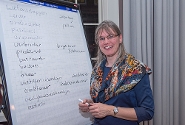
The activist professor
The symposium was about the various ways in which Islam is manifested in Dutch society, and how a university should approach this topic. It began with a few short addresses and a round table discussion between a politician, a representative of a history teachers’ organisation, a journalist, an imam and an academic. Next there were four parallel sample lectures: an introduction to a specific topic as a taster for the participants, followed by discussion. After this, the guests had ample opportunity to chat or network over drinks and snacks. The meeting was especially honoured by the presence of philosopher Tariq Ramadan, professor in Oxford and Qatar, who gave a very interesting closing address: ‘Professor and activist: for me, not a contradiction but a pleonasm.’
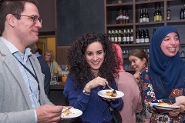
‘All the importantquestions touch on Islam’
This was the view of the politician in the round table discussion. He has noticed that Islam is blamed for just about everything, whether the issue is migrants, criminality or whatever else. Tariq Ramadan, however, took a different view when he spoke later: 'It lies deeper. Nearly all problems can be traced back to the ever-growing gap between rich and poor. Even radicalisation has nothing to do with Islam.’
‘…. occasionally the company car’
Fatiha Azzarhouni (on the right in the photograph at the top, next to Tariq Ramadan), Vice-Director of LIA, started her working life as an IT specialist. In her address, she said the Islam debate used to annoy her, but then she realised how little she actually knew about her own religion. She gave up her job (and the company lease car) in order to study Islamic Theology at Leiden University, a degree programme that is no longer offered. ‘It’s a decision I’ve never regretted, except perhaps occasionally for the company car.’
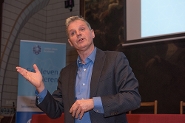
‘Moslims are shoppers’
Maurits Berger, Professor of Islam and the West, gave a sample lecture on Sharia. Should we permit Sharia councils? He very briefly presented the facts about the Dutch legal system, which allows a great deal of freedom, and about Sharia, which for Muslims in Europe is mainly a code of living in areas such as clothing, food and religion. But what happens if you want an Islamic divorce? Some people go to England, where Sharia councils exist. But should these councils also be permitted in the Netherlands? Opinions in the room were divided. One person said, ‘It would be good if there were several different ones. Muslims are “shoppers”, and they go to the council that works out best for them.’ As Tariq Ramadan would say later: ‘One Islam, many cultures.’
‘I am very pleased with this excellent initiative’
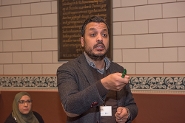
Minister van OCW, Jet The Minister of Education, Culture and Science, Jet Bussemaker, had hoped to attend the launch meeting in person, but was prevented by more pressing political commitments: always the risk with politicians. However she addressed the audience in the room via a video clip, saying how greatly she welcomed the founding of Leiden Islam Academy: ‘I am very pleased with this excellent initiative.’
‘The framework is there, ready to be elaborated’
The symposium was opened by Frank Pieke, Director of the Leiden University Centre for the Study of Religion (LUCSoR). He gave a brief overview of Leiden University’s approach to Islam (since the 16th century), and how Leiden Islam Academy is taking a new step within this. ‘A nuanced approach to teaching and conducting research on the meaning of Islam in the Netherlands requires not only expertise, but especially a great deal of wisdom and courage.’
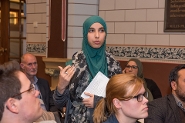
‘Europe has been Muslim for many centuries’
Tariq Ramadan, Professor of Contemporary Islamic Studies at Oxford University, used his own term clash of perceptions as the line of his argument, touching on a wide range of current themes. For instance, he pointed out that Islam in Europe is nothing new: there have been Muslim communities in Eastern Europe for just as long as Christian ones. And what about the colonial past...? Even back in those days, the Dutch East Indies had a large Muslim population. ‘And you never hear anything about that,’ muttered someone in the audience.
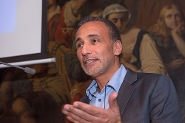
‘Looking down on people is actually a political standpoint’’
Ramadan also said that scholars must always try to find a good balance between research and social engagement. And that they must be very careful not to lose their academic credibility by looking down on groups that are led by fear and emotions: ‘Looking down on people is actually a political standpoint.’
(CH/photography Stefanie Uit den Boogaard)

